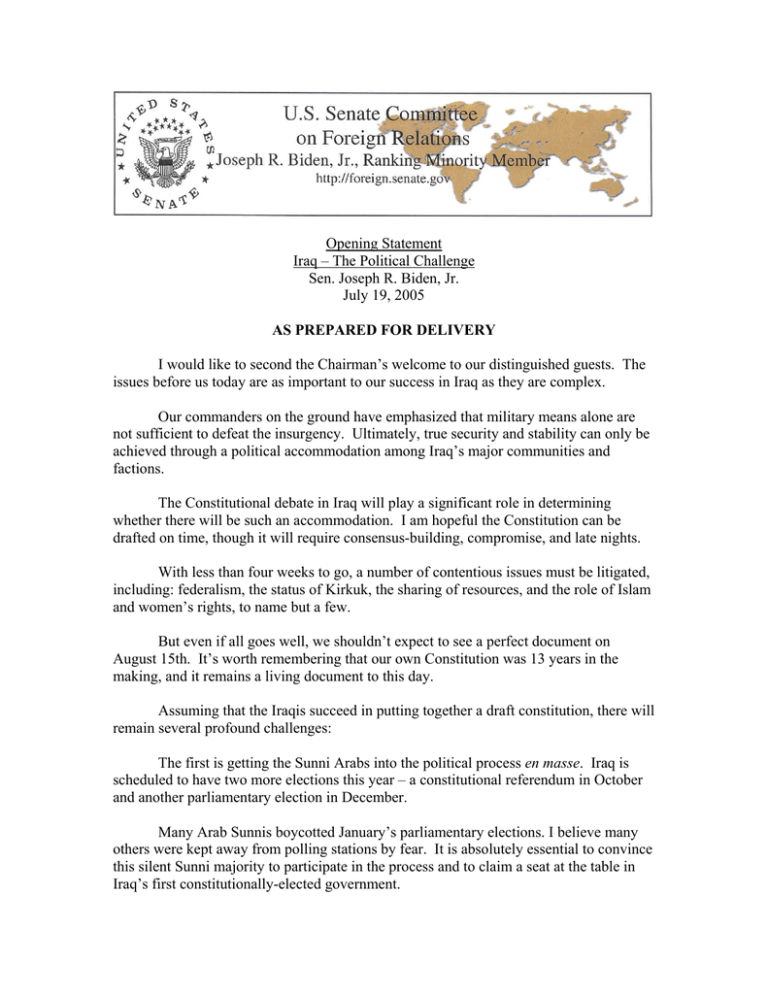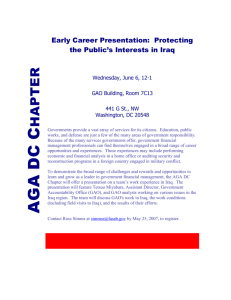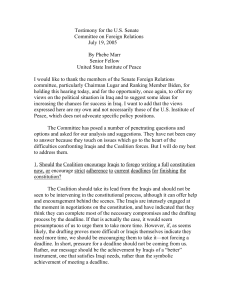Opening Statement Iraq – The Political Challenge Sen. Joseph R. Biden, Jr.
advertisement

Opening Statement Iraq – The Political Challenge Sen. Joseph R. Biden, Jr. July 19, 2005 AS PREPARED FOR DELIVERY I would like to second the Chairman’s welcome to our distinguished guests. The issues before us today are as important to our success in Iraq as they are complex. Our commanders on the ground have emphasized that military means alone are not sufficient to defeat the insurgency. Ultimately, true security and stability can only be achieved through a political accommodation among Iraq’s major communities and factions. The Constitutional debate in Iraq will play a significant role in determining whether there will be such an accommodation. I am hopeful the Constitution can be drafted on time, though it will require consensus-building, compromise, and late nights. With less than four weeks to go, a number of contentious issues must be litigated, including: federalism, the status of Kirkuk, the sharing of resources, and the role of Islam and women’s rights, to name but a few. But even if all goes well, we shouldn’t expect to see a perfect document on August 15th. It’s worth remembering that our own Constitution was 13 years in the making, and it remains a living document to this day. Assuming that the Iraqis succeed in putting together a draft constitution, there will remain several profound challenges: The first is getting the Sunni Arabs into the political process en masse. Iraq is scheduled to have two more elections this year – a constitutional referendum in October and another parliamentary election in December. Many Arab Sunnis boycotted January’s parliamentary elections. I believe many others were kept away from polling stations by fear. It is absolutely essential to convince this silent Sunni majority to participate in the process and to claim a seat at the table in Iraq’s first constitutionally-elected government. 2 Our second challenge is ensuring that the Constitution is more than just words on a piece of paper. This requires accountability and transparency; security and judicial institutions that respect individual dignity, human rights and the rule of law; and a government whose reach extends beyond the Green Zone. An equally profound challenge is sectarianism. On my first visit to Iraq two years ago, very few Iraqis would openly identify themselves as Sunni or Shi’a – it was considered inappropriate. Now, it is all too common… the result of a breakdown in Iraq’s social and security order and the brutal agenda of a small group of religious extremists. We saw a horrific example of this agenda with last weekend’s attack on a Mosque south of Baghdad, which has claimed 100 lives. Thus far, the Shi’a religious establishment has succeeded in keeping the desire for revenge after such attacks in check, but there is evidence of a growing number of reprisal killings against Sunnis. The tentative political progress in Iraq risks being washed away if this rising tide of sectarianism is not stemmed. I repeat what I said yesterday. I believe that we can still succeed in Iraq. By success, I mean leaving Iraq better than we found it… a country with a representative government in which all major communities believe they have a stake, and a country that is not a haven for terror nor a threat to us or its neighbors. I believe that there is an Iraqi nationalism that unites at least Iraqi Arabs. I believe that Iraq’s Kurds, because they understand the realities of their neighborhood, recognize that autonomy in a federal Iraq is a much more realistic option than independence. I look forward to our witnesses’ testimony.





